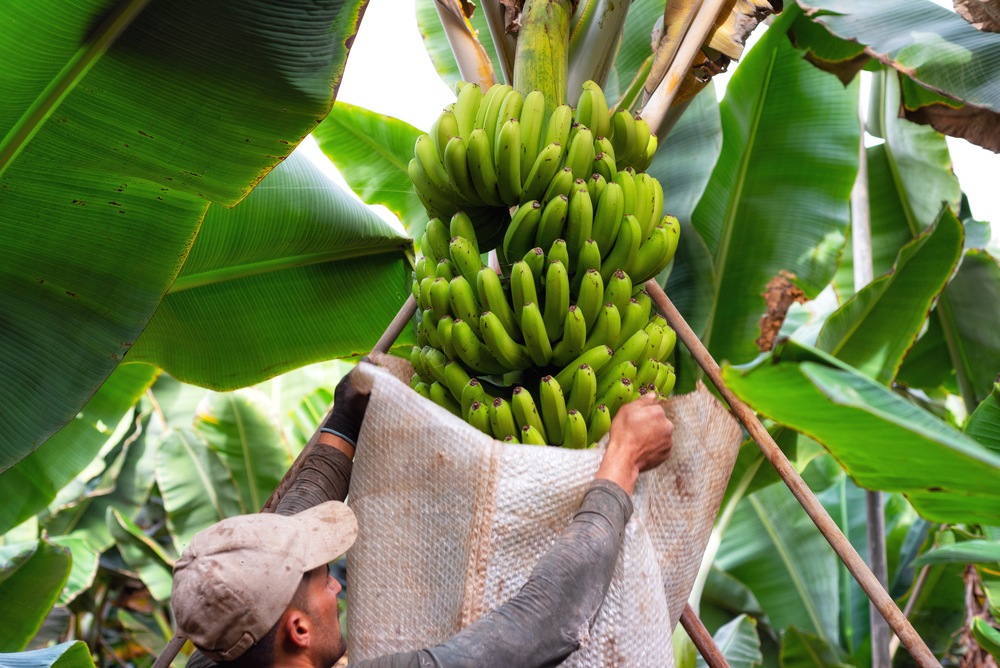Global alliance against fusarium and IICA strengthen technical systems in Venezuela to fight fungus threatening global banana production

Caracas, 13 December 2022 (IICA). The Inter-American Institute for Cooperation on Agriculture (IICA), in partnership with the School of Agronomy of the Central University of Venezuela (FAGRO-UCV), the Venezuelan Institute for Scientific Research (IVIC) and the Venezuelan Musaceae Network (MUSAVEN), strengthened capacities in the South American country to tackle rising cases of the Fusarium fungus strain known as Tropical Race 4 (TR4), which is seriously threatening global banana production.
In Venezuela, sudden wilting in banana plants has impacted production since 2006. The symptoms are very similar to those of Fusarium wilt, manifesting mainly as a yellowing and folding of the lower leaves, a blockage of the vascular tissues, presence of filamentous fungi and reddish gummy stem blight, a shortening of stem internodes and slow and abnormal development along with interveinal necrosis.
In 2022, the country received assistance from the Global Alliance against TR4—supported by IICA—whose mission it is to support the banana sector in facing the challenges posed by the disease through building knowledge, technology and mechanisms to find a scientific solution and help eradicate the disease.
Researchers Yonis Hernández and Rafael Mejías from FAGRO-UCV and Edgloris Marys from IVIC, all members of the Molecular Detection of Emerging Plant Disease and Food Security Cluster, conducted a study on the sudden wilting of banana plants in Venezuela, whose objective was to discover exactly which pathogens were involved in the disease and its potential spread in the country.
Their efforts included:
- Sampling plants that showed symptoms in banana plantations located in the states of Aragua and Carabobo
- Isolating the fungi and bacteria from the culture media
- Performing pathogenicity tests of the isolated fungi and bacteria
- Identifying the isolated pathogens and pathogenic bacteria
- Extracting DNA to identify at the molecular level the isolates obtained through the PCR tests using specific primers
The study found that in the eight production units sampled in the states of Aragua and Carabobo, there was a presence of diseased plants showing symptoms such as yellowing leaves, necrosis and wilting. The organisms causing these symptoms are Fusarium oxysporum f.sp. cubense, predominant in most of the samples analyzed; Ralstonia solanacearum and a soft rot-causing bacterium presumed to be Pectobacterium carotovorum or Dickeya paradisiaca.
“With the help of the Global Alliance against TR4, we were able to create a task force in Venezuela that designed the sampling and worked with the National Institute of Integral Agriculture and Animal Health (INSAI) and UCV to begin isolating and sequencing, and next identify the pathogens with genetic fingerprinting. We are on a very good path toward identifying all the microorganisms involved in banana wilt in Venezuela and we hope to expand the sampling throughout the country”, expressed Edgloris Marys Sarabia, Head of the Plant Biotechnology and Virology Lab at IVIC.
“We can say that the results were satisfactory because we verified that the pathogens mentioned are involved in the sudden wilting of banana plants. The diagnosis was in harmony with the guidelines of the Andean Community; we studied several manuals and designed a sampling system that was the initial part of the diagnosis”, said Yonis Hernández, Head of Phytopathology at FAGRO-UCV.
The Global Alliance against Fusarium TR4 was established in 2021 by IICA and international partners from the private sector and academia, including Bayer, Chiquita Brands International, the International Institute of Tropical Agriculture (IITA), Costa Rica’s National Banana Corporation (CORBANA), the Solidarity Network and the University of Wageningen (Netherlands).
According to experts, due to the complexity and time required to introduce new resistant or tolerant varieties, the best way to combat fusarium wilt is to prevent its spread, since the disease cannot be eradicated. Prevention is the most effective way to fight the disease through the use of certified plant material, quarantine measures and periodic surveys.
Given the strategic importance of bananas to both the diet and income of family farmers, it is important to strengthen capacities to prevent, diagnose, monitor and contain outbreaks of the fungus, as well as to raise awareness and disseminate information among agricultural communities.
More information:
Institutional Communication Division.
comunicacion.institucional@iica.int